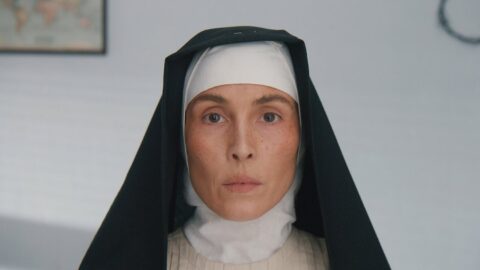It’s not new for a film by North Macedonian writer-director Teona Strugar Mitevska to leave a churned-up audience in her wake. But her last effort, the very personal and even more painful 21 Days Until the End of the World (2022), indicated a recalibration of sorts. While not many of us will actively remember Mitevska’s lockdown-induced descent into a depressive abyss — a clandestinely singular event screening in the Giornate Degli Autori sidebar of the 2023 Mostra di Venezia — those who do recall may have lauded Mitevska’s cardial outpouring, or, at any rate, recognised her intrepid formal probings.
Whereas her most recent films before — God Exists, Her Name is Petrunya (2019) and The Happiest Man in the World (2022) — were deeply invested in the historical traces and political frictions of post-Yugoslavian contemporary life, with special attention to the role of the woman in it, 21 Days, a flawed but genuine look into the incrementally steeper pathway towards madness, displayed a much greater interest in the structure of mundanity. At its strongest, the 21-chapter narrative, arranged like an essayistic countdown, evoked the impossible prose of Kathy Acker, making tangible the silent negotiations inherent in the creation of something that, at the same time, proves too forceful to be withheld, yet wilts under heightened exposure (i.e. by further screenings).
Now, Mitevska returns to Lido with Mother (2025), a not-too-fictionalised rendering of seven days in the life of Mother Teresa, played by the ever-compelling Noomi Rapace. And though it appears that the risk of personal oversharing was deliberately contained, there must have been something to the however jerky countdown rhythm in 21 Days for Mitevska to resort to a similar structure. Or is it rather the mere attempt to break away from the constraints of the biopic genre?
Considering her subject, a literal ‘saint,’ this would seem an all-the-more urgent matter, lest the script contents itself with lifeless hagiography (Who, for instance, remembers Susanna Nicchiarelli’s Chiara [2022], on the eponymous saint of Assisi?). Set in 1948 in Kolkata (then Calcutta), Mother Teresa “anxiously awaits permission from Pope Pius XII to leave the religious congregation of the sisters of Loreto and establish her own order.” Teresa, in other words, is not content with her situation — a familiar premise in the Macedonian’s filmography. And yet, regrettably, neither are we. Not in the end, anyway, when we’re forced to concede that what had seemed like our point of embarkation turns out to be not too far from a summary of the entire film.
Which is not to suggest that there isn’t potential, right from the start. There, we see the sisters of Loreto via an overhead shot squeeze and roll little bread crumb balls, which, in the ensuing sequence, are distributed among the poor street beggars of Kolkata. The initial camera perspective is an early hint at the egalitarianism Teresa claims to pursue at the congregation, a way of viewing that flattens the image — and with it its characters. The shot recurs a couple of times, just like Teresa’s more or less successful attempts at replacing each sister’s name with numbers. Halfway through the film, this is even taken to a symbolic extreme of synchronicity as we see, again from overhead, one sister after the other step forward and throw their period-stained white briefs into a large bucket.
It remains questionable how egalitarian a community (not to mention society) can be if it ultimately relies on one chosen person to assign these numbers. But, as was noted before, there is no necessity for Mitevska to sanctify the sanctified: “I judge her sainthood by her deeds and not by her saintly manners,” it reads in the director’s statement. And further: “Let’s celebrate women as they are, not just [as] selfless martyrs or eternal victims, but as fully developed characters, as persons that can have other ambitions than becoming someone’s wife.”
It’s easy to see why the figure of Mother Teresa would appeal to Mitevska. Born as Anjezë (Agnes) Gonxhe Bojaxhiu in Skopje — then part of the Ottoman Empire — in 1910, Teresa was not only born in the filmmaker’s hometown, but also witnessed her birth country, not completely unlike Mitevska with Yugoslavia, grow into another. And while both of them, in the first half of their life, relocated to an anglophone country to pursue their respective profession — Teresa to Ireland at the age of 18, Mitevska, in her mid-twenties, to New York for film studies at Tisch — this marks about the end of the overt connections that may have drawn Mitevska to the story. Or, it would, were it not for the documentary Teresa and I (2014) that, except for a broadcast on Macedonian TV, was never released and for which she interviewed the four last living sisters in Kolkata. It is upon these sisters’ renditions of their shared time with Teresa that Mitevska bases her narrative, with some of the transcripts finding their way verbatim into the film.
All this may be well and good. It might even help us understand what drew Mitevska to making this film on the occasion of, as she underscores, the 25th anniversary of her filmmaking career. In choosing these seven days around the 38th birthday of Mother Teresa, days during which we see the ‘mother’ increasingly lose her grip on the social order; with her confidante and designated successor, Sister Agnieszka, revealing her pregnancy and “No. 2,” as Teresa calls the much older Sister Katarina, admonishing her to be “mindful of [her] pride;” that “one’s duty [be] above one’s will.” But if there is more to Mitevska’s project than this cumulative process of desacralisation, it does hide well. Exemplary, perhaps, is a montage in which we see Teresa, among her sisters, anachronistically dance to the Lordi’s thunderously blasting Eurovision-2006-winning “Hard Rock Hallelujah.” Should there be provocation in this, it doesn’t land. Nor does it reach the emotional heights of the elegiac dance scene in The Happiest Man in the World. Rather, it brings to mind Michael Sicinski’s description of Mitevska’s 21 Days in In Review Online as “45% poetry and 55% cringe.”
Considering the vast amount of Pope content of recent memory — whether fictional or real — it, at least retrospectively, appears to have been only a matter of time until the Catholic Church’s female top seller would enter the centre stage of contemporary cinema. What is — and remains — baffling, though, is that a director so attuned to political friction and female interiority would voluntarily restrain the scope of her vision to such an extent. For in the end, these seven days, irrespective of their bearing upon our real world, feel strangely inconsequential.
Patrick Fey is a freelance critic, whose writing has appeared on Kino-Zeit, Critic.de, Filmstarts and Moviebreak.




